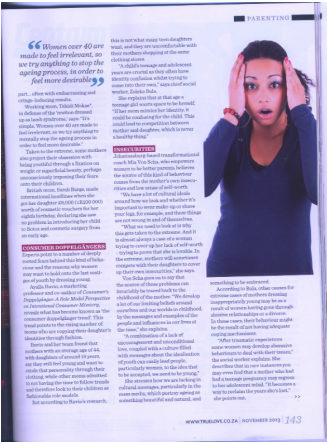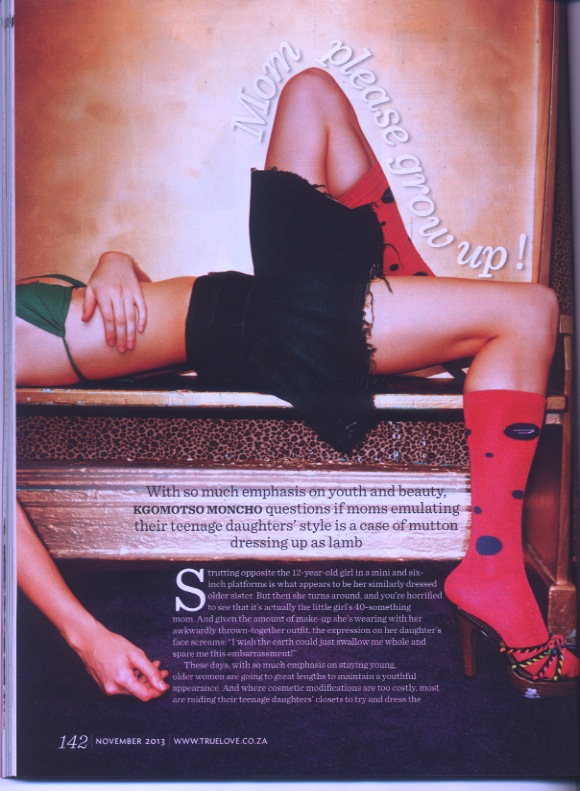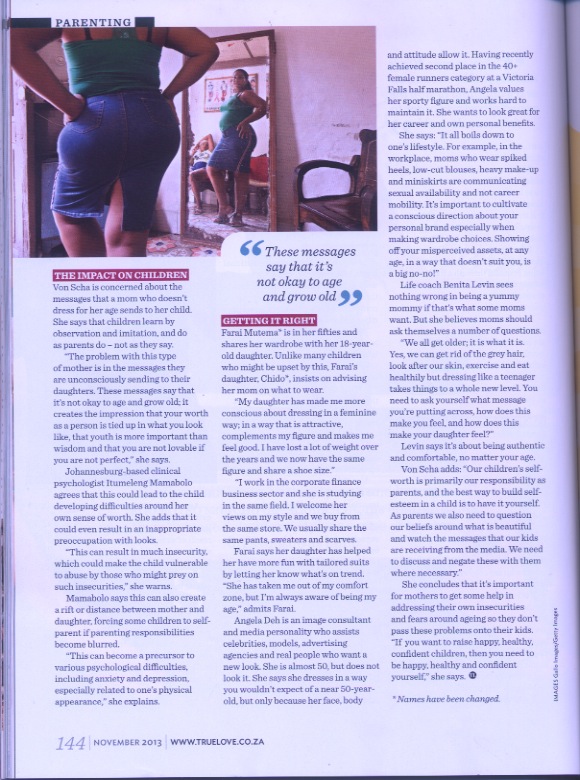
Mia Von Scha chats to Kgomotso Moncho of True Love magazine about why mothers emulate their teenage daughters' style. They look at how the media coupled with a lack of self-worth can exacerbate this desperate need for youth and beauty above all else and the message this sends to their daughters.
We need to be really careful with the way that we live our lives and the messages that this sends to our kids. Children learn by observation and imitation, and so do as you do and not as you say. The problem with mothers like this is in the messages they are unconsciously sending to their daughters – messages that it is not ok to age and grow old, that your worth as a person is tied up in what you look like, that youth is more important than wisdom, that you are not lovable if you are not perfect and so on.
Obviously the source of this kind of behaviour comes from the mother's own insecurities and sense of self worth. A person with a strong sense of self-worth and self love will not find it necessary to overdo things like dressing up, make-up, or in the extreme, cosmetic surgery. We have a lot of cultural ideals around how we look and whether it is important to wear make-up or shave your legs for example, and these things are not wrong in and of themselves. What we need to look at is why this is being taken to the extreme. And it is almost always a case of a woman trying to cover up her lack of self worth – trying to prove that she is lovable. In the extreme, mothers will sometimes compete with their daughters to cover up their own insecurities. If you look deeply into what is going on internally in these women you will find some basic needs that are not being met. They see the attention that their daughters are getting, and then their own lack of love, connection and significance, and they try to fulfill these needs for themselves by emulating their daughters.
The real source of these problems can invariably be traced back to the childhood of the mother. We develop a lot of our limiting beliefs around ourselves and our worlds in childhood by the messages and examples of the people and influences in our lives at the time. A combination of a lack of encouragement and unconditional love, coupled with a culture filled with messages about the idealisation of youth can easily lead, particularly in women, to the idea that to be ok, to be accepted, we need to be young. We are lacking, generally, in cultural messages, particularly in the mass media, that portray aging as something beautiful and natural and something to be embraced. Where are the images of wise elderly figures, guiding the youth with their knowledge and experience?
Now we have a long way to go in terms of changing the mass media, but as parents it is our responsibility to our children to give them the right messages. And the first of these would be that they are worthy as human beings and loved and lovable regardless of what age they are, what they look like, how much money they have or where they live. Too many children are growing up comparing themselves to these ideals that they see in the mass media, unrealistic ideals that they cannot live up to, and then finding themselves to be lacking. Our children's self-worth is primarily our responsibility as parents, and the best way to build self-worth in a child is to have it yourself – to love yourself unconditionally regardless of what age you are or what you look like. As I said, children learn by imitation, and if they have a parent who is confident and secure in who they are, with all their typical human flaws, then they will grow up in the same way.
As parents we also need to question our beliefs around what is beautiful, and watch the messages that our kids are receiving from the media and discuss and negate these with them where necessary. And we need to emphasise internal qualities as desirable rather than external ones – qualities like love, kindness, compassion, respect and wisdom – qualities that are within our control. It is our responsibility as parents to work on valuing these qualities in ourselves, and taking time to work on our own issues otherwise we will end up passing these on to our kids. We are all going to age, it is a fact of life, and I don't think any of us would wish for our children half a lifetime of feeling miserable because they're no longer "young and attractive". All parents want their children to be happy, and to ensure this we need to help them to feel ok with themselves at all ages and stages of life.
Obviously the source of this kind of behaviour comes from the mother's own insecurities and sense of self worth. A person with a strong sense of self-worth and self love will not find it necessary to overdo things like dressing up, make-up, or in the extreme, cosmetic surgery. We have a lot of cultural ideals around how we look and whether it is important to wear make-up or shave your legs for example, and these things are not wrong in and of themselves. What we need to look at is why this is being taken to the extreme. And it is almost always a case of a woman trying to cover up her lack of self worth – trying to prove that she is lovable. In the extreme, mothers will sometimes compete with their daughters to cover up their own insecurities. If you look deeply into what is going on internally in these women you will find some basic needs that are not being met. They see the attention that their daughters are getting, and then their own lack of love, connection and significance, and they try to fulfill these needs for themselves by emulating their daughters.
The real source of these problems can invariably be traced back to the childhood of the mother. We develop a lot of our limiting beliefs around ourselves and our worlds in childhood by the messages and examples of the people and influences in our lives at the time. A combination of a lack of encouragement and unconditional love, coupled with a culture filled with messages about the idealisation of youth can easily lead, particularly in women, to the idea that to be ok, to be accepted, we need to be young. We are lacking, generally, in cultural messages, particularly in the mass media, that portray aging as something beautiful and natural and something to be embraced. Where are the images of wise elderly figures, guiding the youth with their knowledge and experience?
Now we have a long way to go in terms of changing the mass media, but as parents it is our responsibility to our children to give them the right messages. And the first of these would be that they are worthy as human beings and loved and lovable regardless of what age they are, what they look like, how much money they have or where they live. Too many children are growing up comparing themselves to these ideals that they see in the mass media, unrealistic ideals that they cannot live up to, and then finding themselves to be lacking. Our children's self-worth is primarily our responsibility as parents, and the best way to build self-worth in a child is to have it yourself – to love yourself unconditionally regardless of what age you are or what you look like. As I said, children learn by imitation, and if they have a parent who is confident and secure in who they are, with all their typical human flaws, then they will grow up in the same way.
As parents we also need to question our beliefs around what is beautiful, and watch the messages that our kids are receiving from the media and discuss and negate these with them where necessary. And we need to emphasise internal qualities as desirable rather than external ones – qualities like love, kindness, compassion, respect and wisdom – qualities that are within our control. It is our responsibility as parents to work on valuing these qualities in ourselves, and taking time to work on our own issues otherwise we will end up passing these on to our kids. We are all going to age, it is a fact of life, and I don't think any of us would wish for our children half a lifetime of feeling miserable because they're no longer "young and attractive". All parents want their children to be happy, and to ensure this we need to help them to feel ok with themselves at all ages and stages of life.




